 Abraham Lincoln
If given the truth, the people can be depended upon to meet any national crisis...
Abraham Lincoln
If given the truth, the people can be depended upon to meet any national crisis...
 Guildford news...
for Guildford people, brought to you by Guildford reporters - Guildford's own news service
Guildford news...
for Guildford people, brought to you by Guildford reporters - Guildford's own news service
The Potters and The Rapleys: Who Do You Think You Are?
Published on: 28 Jul, 2013
Updated on: 28 Jul, 2013
By David Rose
There’s a new series of the popular genealogy programme Who Do You Think You Are? now showing on BBC1. If you didn’t know, it features celebrities tracing their family trees (with a lot of expert help). My interest and research into local history often goes much further afield than Guildford, especially when it concerns my passion for collecting old bottles.
Not content to simply add bottles from the Victorian, Edwardian and later eras to my collection, I often look into the people who made the products that went into the bottles and the packaging they used. In most cases, just like the TV show mentioned, some fascinating stories of social and business history emerge.
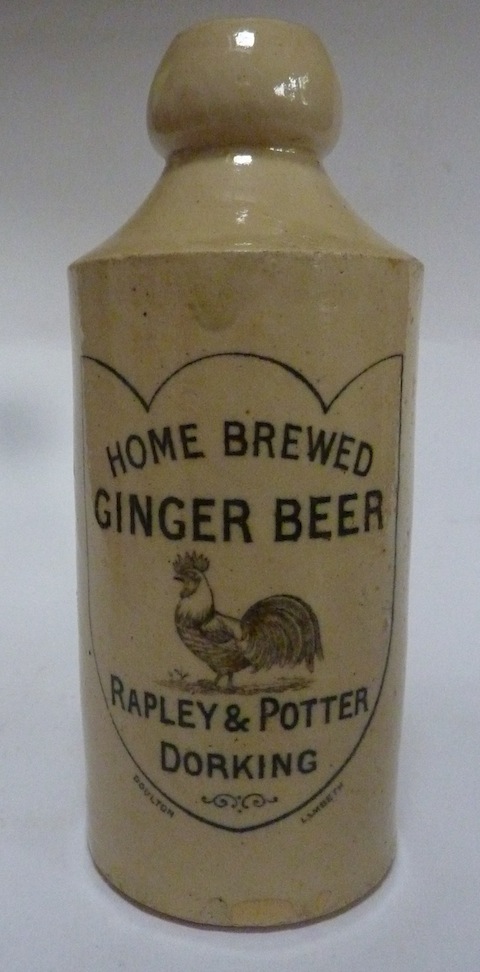
Stoneware ginger beer bottle printed with the words ‘Home Brewed Ginger Beer / Rapley & Potter / Dorking. Note the detailed illustration of the famous five-toed Dorking cockerel.
But as always, the more I find out about a particular firm or individual, more questions emerge. A lot of this research that I do is with a fellow collector, Ron Sims of Ottershaw. Here is one of our latest projects – finding out about a little know maker of ginger beer from Dorking – William Potter and his family; and a business link he had with someone by the name of Rapley.
The internet is a wonderful tool for finding out details for this kind of research, as well as putting out via the world wide web appeals for more information. You just don’t know who may stumble upon these requests, from anywhere in the world.
As you will read, we are keen to trace descendants of the Potter and Rapley familes who may well still be living in the Surrey area, or perhaps further afield.
From a local bottle collector’s point of view, the most pleasing ginger beer bottles from the county of Surrey are those marked ‘Rapley & Potter’ or ‘Potter & Son’ from Dorking.
The white stoneware bottles with their pleasing illustration of the five-toed Dorking cockerel were made by the London pottery firm of Doulton. To a local bottle collector they are known to be quite rare, and they date back to about 1900.
Following some recent research, we now know certain details about the business, but there are still many unanswered questions….
We’ll start with the Potters, as a lot more has been found out about them. The Potters go back a long way in Dorking. On the 1871 census a William Potter was then aged 25 and living with his uncle, Charles Harding, who was the publican of the Queen’s Head in South Street. Born in Horsham, William’s occupation was given as a ginger beer merchant.
By the 1881 census he was at another address in South Street (believed to be number 26), married to Eleanor (originally from Leatherhead) with two young children.
Ten years later, on the 1891 census, the Potters had moved to Leslie Road, Pixham, and now there were seven children – Janet, Frederick, Richard, Ethel, Walter, Albert and Arthur, ranging in age from 12 to two years.
A newspaper report of 1894 makes sad reading as it concerns the inquest of twin girls of the Potters, who died of suffocation at the age of three weeks and two days.
The inquest found that their deaths were accidental. It would appear that when born they were quite weak. Mr and Mrs Potter had them sleeping in the same bed as themselves to keep the twins warm, but one night when Mrs Potter awoke to check on them they were not stirring and had died.
Life was almost certainly hard for them. Making and selling ginger beer was not an easy way to earn a living, with rival firms also making fizzy pop in the town.
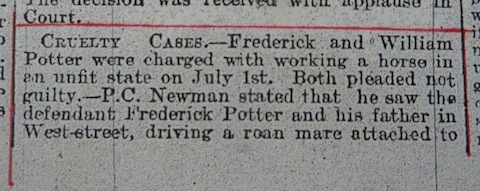
Above and picture below, story from the Surrey Mirror of 1899, regarding the Potters’ court appearance for cruelty to a horse.
In 1899, William had his son Frederick working with him. They were fined 10 shillings each (50p) when they pleaded guilty to the charge of ill-treating a horse, working it in an unfit state on July 5 that year.
A newspaper report stated: “PC Newman saw Frederick Potter and his father in West Street driving a roan mare attached to a four-wheeled van loaded with ginger beer bottles.”
The report added: “Supt Alexander examined the horse outside the police station. He saw a sore on the horse’s back and said to defendants, ‘This is a very bad sore you have here.’ William Potter replied, ‘Yes it is, but I didn’t know it was so bad’.”
It is known that at the time of the 1911 census the Potters lived at 5 Leslie Road, Pixham. Interestingly, on that census William is listed as a wood dealer – perhaps he had ceased to make ginger beer by then. Also on the same census son Walter is listed as a greengrocer and was living at 12 Leslie Road.
William Potter died on December 13, 1913. On his death certificate it states he was a general labourer. No mention of being a wood dealer or selling ginger beer!
Coming on in time, we have traced the Potter family up to 1960. In that year greengrocer Walter Potter (son of William) was killed in a road accident; his many loyal customers would have been shocked to hear the news.
Walter Potter was 75 years old, and was on his usual delivery round when he was in collision with a motorcyclist. He’d been in business for at least 50 years and it is believed his mode of transport at the time was still his horse and cart.
At the time of his death it was reported that Walter Potter had a shop at 22 Pixham Lane. He also delivered his fruit and veg to customers in Dorking and the surrounding villages. The newspaper report of his death notes that he was a great supporter of Dorking football club and an old member of Dorking Imperial Services Club. He left a widow, two sons and three daughters, and eight grandchildren.
We think that there may well be Potters living in the Dorking area today. If some of them could be traced they might hold useful clues about the family history and its involvement in making ginger beer.
But who was ‘Rapley’. The name has been much harder to trace, although the name continues to be fairly widespread in this part of Surrey.
Could this Rapley have been a short-lived business partner with William Potter? Perhaps he put some money into the firm and helped pay for a quantity of bottles and had his name put on them?
It is strange, although all bottles are rare, more ‘Rapley & Potters’ turn up than ‘Potter & Son’. It’s believed that the ones marked ‘Rapley & Potter’ date to about 1900 or a few years earlier. The ‘Potter & Son’ may have been in use a few years later when one of the sons (Frederick or Walter) had joined his father in the business.
Among local bottle collecting circles it is rumoured that there is another variation marked ‘Potter & Co’. Can anyone show us an example? Glass bottles also exist marked ‘W. Potter / Dorking’.
Has anyone seen any other types of bottles from the firm – whether just ‘Potter’ or ‘Rapley & Potter’?
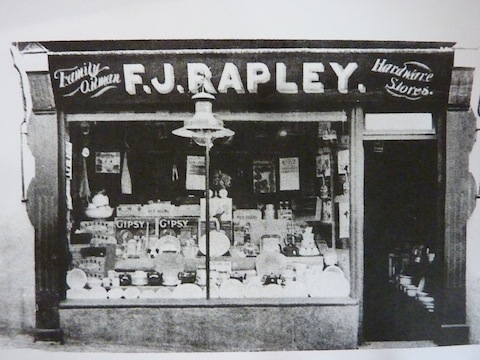
The front of F. J. Rapley’s shop in South Street, Dorking. The sign states he was a ‘family oilman’ and it was a ‘hardware stores’. Picture courtesy Dorking Museum.
An F. J. Rapley was once in business in South Street, Dorking, selling hardware and trading as an ‘oil man’. He sold paraffin that was used in oil lamps. It was an important trade in the days before electric light. Currently, he’s the most likely person we have traced who may have been in business with William Potter. They were both active trading in Dorking at the same time at the turn of the 20th century.
F. J. Rapley’s son, Frank, joined the family firm after the First World War, and later may have moved the business to a shop in the High Street.
Information gleaned so far has come from official records, newspaper reports, and with help from staff at Dorking Museum.
A version of this story has already appeared in the Surrey Advertiser in the hope that someone from either the Potter or Rapley families may read it and will come forward with some information. A Janet Rapley of Ewhurst called to confirm that there are indeed a number of people still in the area with the name Rapley and that they are likely to be descended from the Rapleys of Dorking, that was at one time a large family.
Although she could not add any specific details of the Rapley connected with the Potters, she said her late husband’s grandfather was a William James Rapley, born in 1874. Perhaps he’s our man and not the F. J. Rapley?
Can you help? If so, call David Rose on 01483 838960. Email: drosedragon@gmail.com
Recent Articles
- Loseley House Closed for ‘Gentlemanly’ Filming
- Opening 3-0 Loss for City But Scoreline Does Not Tell the Whole Story
- Letter: Worplesdon Parish Council – Only Guilty of Being Good
- ‘Emergency’ Roadworks Commence Without Warning, Closing Portsmouth Road
- Police Investigate Public Order Offence in Walnut Tree Close
- Woman Arrested After Guildford Town Centre Assault – Witnesses Sought
- Guildford Among Top Quarter for Recycling Rejection Rates in the South East, New Data Reveals
- Highways Bulletin: Roadside Rangers Making a Visible Difference Across Surrey
- Letter: The Enduring Role of Parish and Town Councils
- Mr Carpenter’s Byfleet Seedling and Other Varieties of Apples


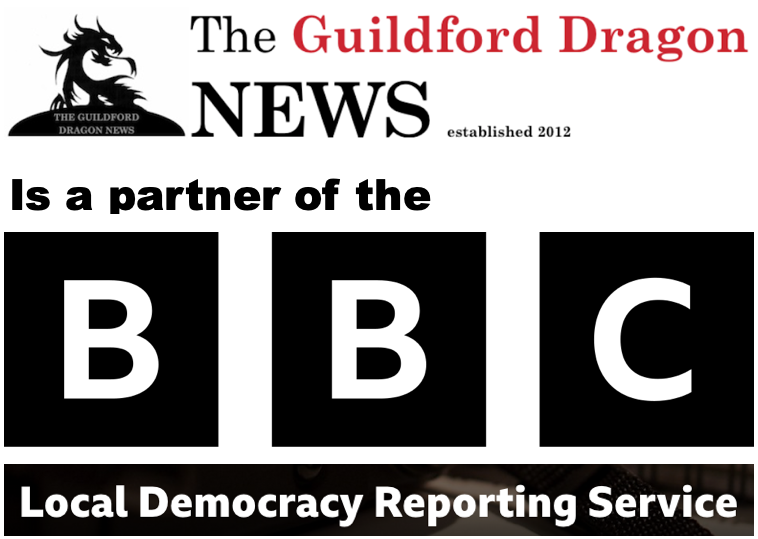
Search in Site
Media Gallery
Dragon Interview: Local Artist Leaves Her Mark At One of England’s Most Historic Buildings
January 21, 2023 / No Comment / Read MoreDragon Interview: Lib Dem Planning Chair: ‘Current Policy Doesn’t Work for Local People’
January 19, 2023 / No Comment / Read MoreA3 Tunnel in Guildford ‘Necessary’ for New Homes, Says Guildford’s MP
January 10, 2023 / No Comment / Read More‘Madness’ for London Road Scheme to Go Ahead Against ‘Huge Opposition’, Says SCC Leader
January 6, 2023 / No Comment / Read MoreCouncillor’s Son Starts Campaign for More Consultation on North Street Plan
December 30, 2022 / No Comment / Read MoreCounty Council Climbs Down Over London Road Works – Further ‘Engagement’ Period Announced
December 14, 2022 / No Comment / Read MoreDragon Interview: GBC Reaction to the Government’s Expected Decision to Relax Housing Targets
December 7, 2022 / No Comment / Read MoreHow Can Our Town Centre Businesses Recover? Watch the Shop Front Debate
May 18, 2020 / No Comment / Read More



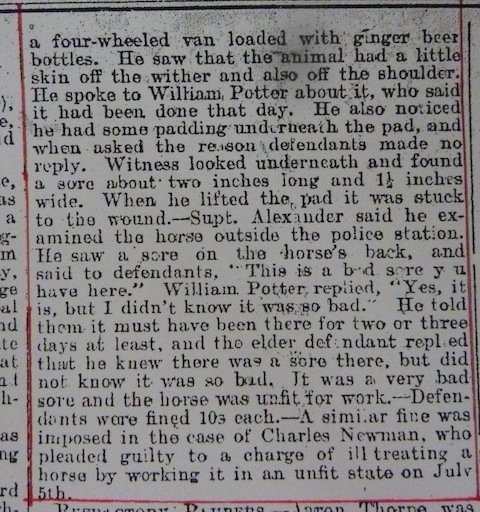
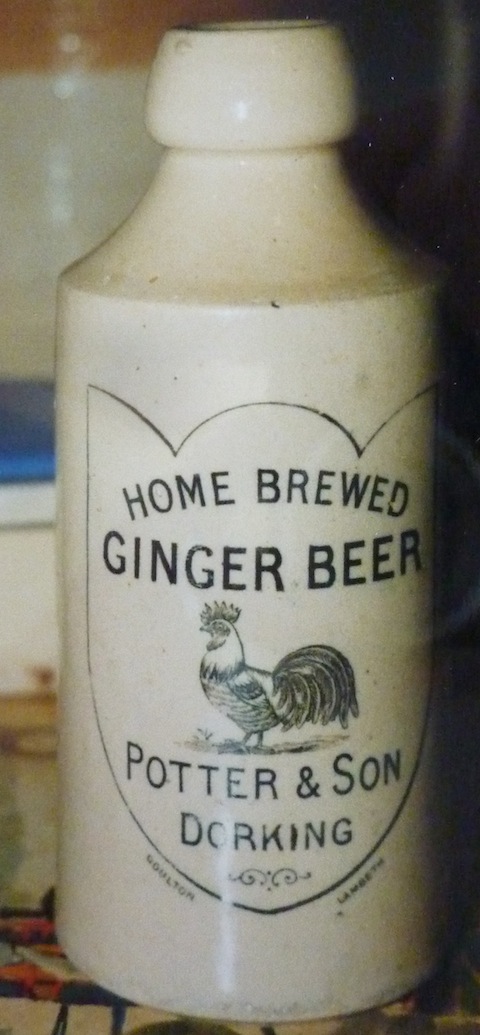



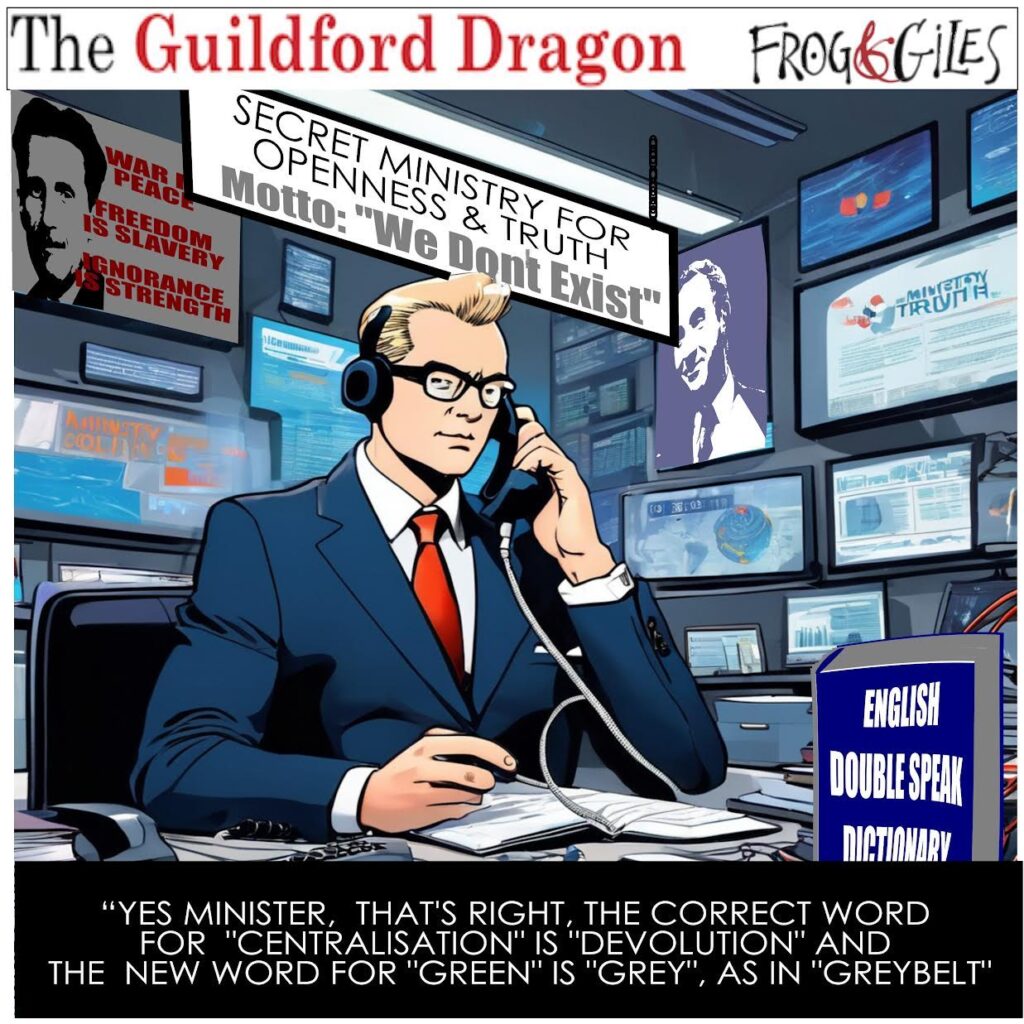
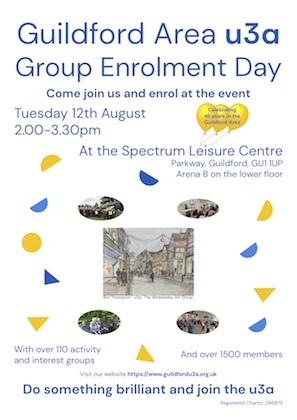




Recent Comments